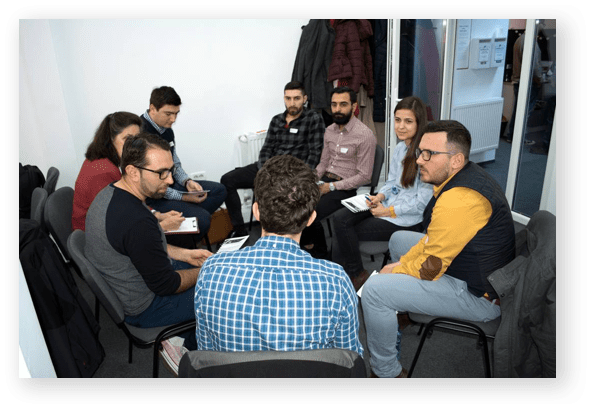It all started on a bus ride to Bulgaria. I found myself seated next to a guy named Mircea, who I barely knew. Three hour road trips have a way of making friends out of acquaintances, and Mircea and I found ourselves lost in conversation both down and back from the old castle our group was visiting.
Mircea reminisced about his family in the north of Romania and his post-college adventures in the western cities of Timisoara and Arad. He told me that moving to Bucharest for work was a huge gamble, but God provided time and again. Mostly, though, Mircea talked about how stressed out he was at his advertising job. True, he said, the profession calls for high levels of creativity and pizzazz. But the long hours, demanding deadlines and lack of truly understanding his colleagues made Mircea wish the clock would tick a little bit faster.
I, on the other hand, am employed to call people to consider God’s hand in their lives. I don’t work in the secular arena; I teach theology at a seminary and encourage church planting efforts. But when Mircea began talking about how he wished he could find joy in his job, I knew God was calling me to ask about how Mircea’s faith relates to the work he does. I’m glad I did.
What might it look like for your friend to view their workplace as a mission field?
The Landscape
My conversation with Mircea made me curious to find out if other young evangelicals in Romania were asking similar questions. Because I like to probe for questions and listen to people, I somehow convinced Mircea and another missionary friend named Jeff to help me interview several Romanian men and women about their experiences of how their churches are equipping them to live out their faith. Do their churches provide tools for sharing Christ? Do church members talk about the struggles of perhaps being the only Christian in the secular workplace? How do they see their work as glorifying to God? What we found was discouraging.[1]
Consider first the religious landscape. Even though roughly 90% of Romania is Eastern Orthodox, Romania is also sometimes referred to as the “Bible Belt of Europe.” With statistics showing a Protestant-Evangelical population nearing 6% and well-developed Baptist, Brethren, and Pentecostal Unions, it would be easy for some mission advocates to remove Romania from lists of potential mission fields.[2] Moreover, short-term mission teams from Canada, the US, and Western Europe rotate regularly into the country, bringing gospel teaching and materials every year since the Romanian Revolution of 1989.
So, if things are so good, what is the problem? As we see it, the problem is threefold:
- During Romania’s long history dealing with atheistic Communism, many Romanian church members did not share their faith openly for fear of persecution. Now a generation removed from this reality, the mentality of stark separation between church and “world” is still ingrained in many people’s minds.
- While the teaching materials Western missionaries bring into Romania are often solid, the fact remains that such materials almost always originate outside of Romania. Written by Western authors, and often intended for Western learners, Romanian ministry leaders must learn to contextualize (not simply translate) these resources. This is a long process that admittedly does not yield desired results of cultural transformation.
- Like the rest of the world, Romania is rapidly urbanizing. What this means for Romania’s churches varies according to each city. In Bucharest, for example, young business professionals often work 10-12 hour days and fight crowded metro and bus lines, leaving little extra time for midweek group meetings. Precious free time may be hard to concede to material that appears irrelevant to their lives.
The Vision
What we are pursuing, then, is a contextualized ministry to help Romanians bridge their Sunday worship with the Monday grind. It is not enough to merely discuss the necessity of “bringing Christ into the workplace.” Like Mircea, the men and women we’ve spoken with want more.
So we decided to start conversations. Our aim is community-building: to help Romanian evangelical business people realize they are not alone. Partnering with several out-of-the-box thinkers from both churches and parachurch groups, we began with beta test seminars that include Romanian Christian business leaders as speakers and small group leaders. That was a year ago, and the response has been phenomenal. Romanians challenge Romanians. I (and any other non-Romanian in the room) help with seminar organization and then watch God move.
We call our initiative Credință la Muncă (Faith at Work). So far we’ve hosted biannual seminars in both Bucharest and Timisoara, with more potential cities on the horizon. Our vision is to create a disciple-making movement among the Romanian business community for the glory of God.
Romanian business people
Living out their faith daily on the job
Making disciples as they go
For the glory of God.
Conclusion
The point of all this talk of contextualized mission is reproducibility for kingdom impact. We want to see lives changed that will ripple through Romania and spill into other contexts. In many ways, I think everyone wants that – to be caught up in God’s mission of making disciples of all peoples. That’s why I’m writing this sentence. That’s why you, the reader, clicked on this link. What might it look like for your friend Muhammed, Pablo, Maria or Jane to view their workplace as a mission field? Questions like this one started our journey in Romania. Perhaps God is preparing a similar journey for you.
Learn more about work and the good life at The Wisdom Forum.

[1]Our findings were published in Cameron D. Armstrong, Tara M., and Jeff Cardell, “Vocational Witness in the Romanian Workplace: Realities and Responsibilities,” Global Missiology English 1, no. 14 (August 1, 2016), accessed January 2, 2018, http://ojs.globalmissiology.org/index.php/english/article/view/1922.0:00 AM.
[2]Included in the category of “Protestant-Evangelical” are also groups which are doctrinally not identified as such (Jehovah’s Witness and Mormons, for example). National Institute of Statistics Romania, What does the 2011 census tell us about religion? (Bucharest, Romania: National Institute of Statistics Romania, 2013). Also, while some pockets of Romania depict a high evangelical percentage, such as Arad in western Romania, other regions are miniscule. Bucharest, the nation’s capital, is less than 1% evangelical.
Image Credit: Ștefan Jurcă from Munich, Germany / Wikimedia Commons




No comments have been added.